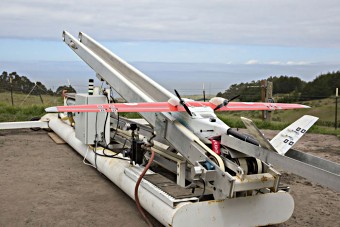Gavi joins World Economic Forum Center for the Fourth Industrial Revolution

In 2016, Rwanda demonstrated the potential of drone delivery for blood supplies using Zipline drones. Gavi will help to develop a framework at the Center to set standards for drones in tomorrow’s airspace. Credit: UPS/2016.
Davos, Switzerland, 24 January 2018 - The World Economic Forum (WEF) has announced that Gavi will become the first international non-profit organisation to partner with WEF’s Center for the Fourth Industrial Revolution.
“Where steam once led to mechanisation, electricity to mass production and IT to automation, this fourth revolution is fusing technologies to achieve something new,” said Gavi CEO, Dr. Seth Berkley. “We believe the Fourth Industrial Revolution can help us overcome some of the challenges preventing us from reaching every child.”
The Center will bring together business leaders, governments, start-ups, civil society, academia and international organisations to collaborate in developing policy for emerging technologies, ranging from drones and Blockchain to precision medicine and artificial intelligence.
Sharing insight from Gavi’s experience
By helping to close the governance gap between emerging technology and policy, the Center will support Gavi’s efforts to deploy and scale up innovative solutions in developing countries.
“We want to get vaccines to every single person, and that means we need to use technology to leapfrog to that last mile,” said Dr Berkley. “There are many ways we see in working with this exciting new forum center that can really make a difference in bringing technology to the world’s poor to help solve their problems.”
Gavi will enhance dialogue at the Center by sharing its own experiences in the use of technologies in health. For example, the Center plans to develop a framework to set standards for drones in tomorrow’s airspace. Gavi can provide insights from our partnership with Zipline and the Rwanda Government. The latter partnered with the Center on regulations passed last week which will support its drone rollout.
The first Center
We believe the Fourth Industrial Revolution can help us overcome some of the challenges preventing us from reaching every child.
Dr Seth Berkley, Gavi CEO
WEF opened its first Center for the Fourth Industrial Revolution in San Francisco in March 2017, in order to develop policy in response to emerging technologies. The fourth industrial revolution is leading to change at an unprecedented rate, leaving legislators and regulators struggling to keep up. By bringing together global partners, the Center aims to develop policy that ensures the fourth industrial revolution has a sustainable and positive impact for everyone.
The Governments of India, Japan and the United Arab Emirates have announced their partnership with the Center and the opening of sister centers in their countries.
Relentless drive for innovation: Gavi INFUSE
Partnering with the Center with Gavi’s announcement of the third call for innovations for its Uptake, Scale and Equity in Immunisation (INFUSE) platform. INFUSE is an ecosystem which identifies exciting new technologies that are relevant to the modernisation and improvement of immunisation systems.
Launched in 2016, INFUSE seeks tried and tested innovations that have potential to improve vaccine delivery, and “infuses” them with capital and expertise to help take them to scale. These achievements have only been possible through Gavi’s relentless drive for innovation and the resulting transformational partnerships with Gavi-supported countries, donors and investors.
The 2018 INFUSE challenges companies to harness digital technology to find, identify and register children, especially girls, who are missing out on life-saving vaccines.
“One of the problems in the world is the fact that a quarter of children are not registered. Since every family, virtually, gets a child health card when they have an immunisation, we want to link that with the work on digital identity and being able to use digital technology to track births,” said Dr Berkley.
